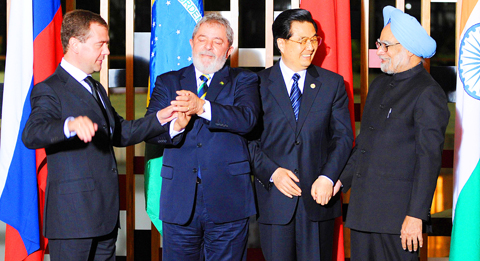Leading emerging powers on Thursday called for swift reform of international financial institutions to give developing countries a greater voice, saying their group was vital to achieving a new world order.
The call from the increasingly influential BRIC countries — Brazil, Russia, India and China — for more say in global financial institutions such as the World Bank and the IMF came ahead of this month’s G20 finance ministers’ and IMF meetings in Washington.

PHOTO: AFP
MORE CLOUT
The leaders of the four countries said that voting share reforms at the World Bank to give developing countries more clout should be approved at the IMF meetings.
Setting a specific deadline, the group also said those reforms should be completed by a G20 summit in November.
“Brazil, Russia, India and China have a fundamental role in creating a new international order that is more just, representative and safe,” Brazilian President Luiz Inacio Lula da Silva said after holding talks with his counterparts.
The group has been pushing for reforms since the global financial crisis of 2008, arguing the current system is unfairly dominated by advanced economies such as the US, Japan and Europe.
The statement said the group would resist all trade protectionism and look into increasing commerce with one another in local currencies, bypassing the US dollar.
However, the group, which has rowed back from talk last year of setting up a new reserve currency, stressed the importance of maintaining the stability of major reserve currencies.
As the largest holder of US Treasury bonds, China is not keen to see the value of its investments diminish.
The BRIC summit, held in Brasilia, was scaled back when Chinese President Hu Jintao (胡錦濤) decided to go home early to deal with a major earthquake in a remote western region of China.
In one of their few concrete steps toward cooperation, the countries’ national development banks signed an accord enabling them to fund projects in one another’s countries, Brazil’s National Development Bank president Luciano Coutinho said, adding that the agreement covered the infrastructure, energy, sustainability and technology sectors.
China and Brazil, the largest economies in Asia and Latin America, used the summit to bolster growing ties with trade and investment agreements.
‘ACTION PLAN’
Hu and Lula signed a five-year “action plan” aimed at boosting trade and energy cooperation. The two nations have grown closer in recent years amid a surge in commerce — last year, China became Brazil’s top trade partner.
The projects agreed upon included a US$5 billion steel mill at the Acu port in Rio de Janeiro state that would be China’s biggest investment in Latin America’s largest country, home to some of the world’s largest iron ore deposits.
China’s Wuhan Iron and Steel (武鋼) and Brazilian logistics firm LLX Logistica, controlled by billionaire Eike Batista, will build the plant.
China’s Sinopec (中石化) and the country’s development bank signed a strategic development agreement with Brazil’s state-run oil giant Petrobras, Sinopec chairman Su Shulin (蘇樹林) said.
Su said the deal would cover the development of Brazilian oil resources and trade with China.

A Chinese freighter that allegedly snapped an undersea cable linking Taiwan proper to Penghu County is suspected of being owned by a Chinese state-run company and had docked at the ports of Kaohsiung and Keelung for three months using different names. On Tuesday last week, the Togo-flagged freighter Hong Tai 58 (宏泰58號) and its Chinese crew were detained after the Taipei-Penghu No. 3 submarine cable was severed. When the Coast Guard Administration (CGA) first attempted to detain the ship on grounds of possible sabotage, its crew said the ship’s name was Hong Tai 168, although the Automatic Identification System (AIS)

An Akizuki-class destroyer last month made the first-ever solo transit of a Japan Maritime Self-Defense Force ship through the Taiwan Strait, Japanese government officials with knowledge of the matter said yesterday. The JS Akizuki carried out a north-to-south transit through the Taiwan Strait on Feb. 5 as it sailed to the South China Sea to participate in a joint exercise with US, Australian and Philippine forces that day. The Japanese destroyer JS Sazanami in September last year made the Japan Maritime Self-Defense Force’s first-ever transit through the Taiwan Strait, but it was joined by vessels from New Zealand and Australia,

CHANGE OF MIND: The Chinese crew at first showed a willingness to cooperate, but later regretted that when the ship arrived at the port and refused to enter Togolese Republic-registered Chinese freighter Hong Tai (宏泰號) and its crew have been detained on suspicion of deliberately damaging a submarine cable connecting Taiwan proper and Penghu County, the Coast Guard Administration said in a statement yesterday. The case would be subject to a “national security-level investigation” by the Tainan District Prosecutors’ Office, it added. The administration said that it had been monitoring the ship since 7:10pm on Saturday when it appeared to be loitering in waters about 6 nautical miles (11km) northwest of Tainan’s Chiang Chun Fishing Port, adding that the ship’s location was about 0.5 nautical miles north of the No.

COORDINATION, ASSURANCE: Separately, representatives reintroduced a bill that asks the state department to review guidelines on how the US engages with Taiwan US senators on Tuesday introduced the Taiwan travel and tourism coordination act, which they said would bolster bilateral travel and cooperation. The bill, proposed by US senators Marsha Blackburn and Brian Schatz, seeks to establish “robust security screenings for those traveling to the US from Asia, open new markets for American industry, and strengthen the economic partnership between the US and Taiwan,” they said in a statement. “Travel and tourism play a crucial role in a nation’s economic security,” but Taiwan faces “pressure and coercion from the Chinese Communist Party [CCP]” in this sector, the statement said. As Taiwan is a “vital trading